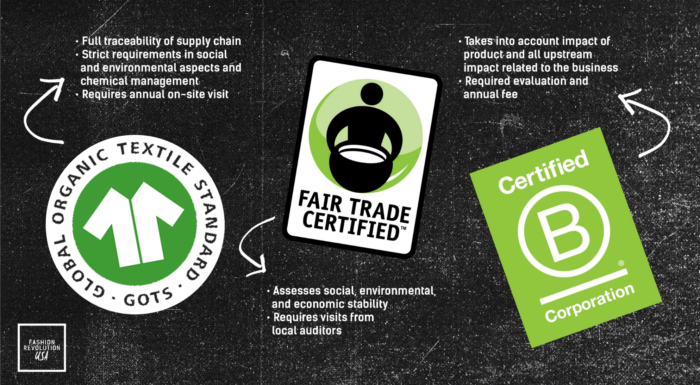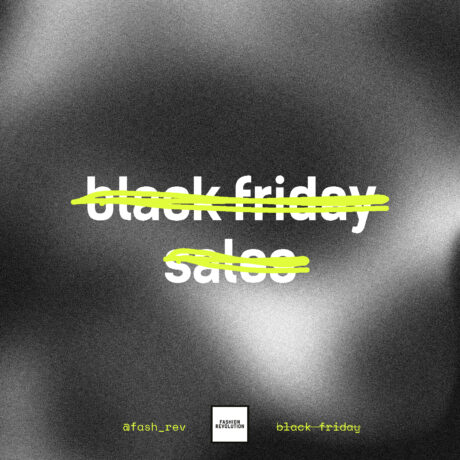This is What You Need to Know About Certifications in Sustainability
What does GOTS mean? What exactly is a B- Corp? Keep reading if you have been seeing this terms in the news and social media, but are still wondering what they actually mean in terms of sustainability for the people making our clothes and the impact of the manufacturing on the planet. Fashion Revolution USA spoke with sustainable certifications expert Dorothee Sarah Spehar who explained some of the most ubiquitous ones.
How and when did the fashion certification system get established?
Certifications are not exactly a new thing. Most labels of universal standard holders or independent companies are around for 10+ years. The only thing that changed now is that those textile certifications aren’t a niche demand or B2B-only thing now. For about 4 years now I see a significant increase in auditing demands as certifications now also work as marketing claims and sustainability tools for almost all textile companies.
Do you think there are certifications that are more important than others from a consumer’s point of view? And from a brand’s or producer’s point of view?
The actual importance and how both consumers but also brands and producers prioritize a certification is a bit of a mix-and-match scenario. It largely depends on what your focus and main interests are on. Will say are you, for example, more looking at fair labor conditions?, or is recycling content what matters to you? I am advocating for the certifications which are the most modern, up to date, and globally excepted. Supply chains are so very much international, it wouldn’t make sense to me to just focus on a certification that is relevant in a specific region only. [In any case] I feel like the most well-known are Fair Trade, GOTS/Organic and B- Corp.
 Could you give our readers a 101 lesson on what these mean and how a brand or producer could obtain them?
Could you give our readers a 101 lesson on what these mean and how a brand or producer could obtain them?
GOTS is probably the most known for the organic textile sector. It covers not only the full traceability of the supply chain, but it also has strict requirements in social and environmental aspects and chemical management. The certification requires an annual on-site visit by an external certification body.
Fair Trade is a universal standard that can be applied to a variety of products and businesses. The approach is a way more holistic one as aside from social and environmental regulations this certification also aims to stabilize economically and create a better ecosystem of fair produced and priced products. The certification requires visits from local auditors who will evaluate the set up of your unit in the mentioned above criteria.
B-Corp is an overall certification for company performances. Usually, even if certifications look into let’s say social or human resources the actual measuring and weight of the sustainability evaluation lies more with the product and service. B- Corp considers those factors as well but highlights the impacts of all business dynamics a company has. To be certified a unit is expected to undergo an evaluation and commit to the annual fee plan.
How much do certifications cost the brand? How long are they good for?
It’s not possible to answer this because the costs are set together by the fees for the standard itself, certification bodies, auditors, and travel costs. This added to some certifications offering lower price schemes for smaller brands and the different offers on the market by certification bodies make it almost impossible to give a general quote.
Are certifications necessary in order to sell in certain countries? If so, which ones?
They are not necessary as in like mandatory because that would involve a governmental or general monitoring of sustainable textile production. All the textile certifications we are talking about are voluntary ones, made to change the system but not enforced by law. For some regions, it might defiantly be a smart move in terms of market competition though.
Which options would you pick when trying to pick between different garments with different certifications?
My top pick is an RWS (Responsible Wool Standard) certified knitted dress. Quality and durability and crucial measurements of eco- consciousness for me and I love the option to purchase a classic piece, certified by animal welfare and trade standards.
My second pick is high-quality GOTS certified linen pants. Again, classics will never go out of style but with high traceability in production, social, and environmental procedures.
Another pick is a puffer Jacket with 100% RDS (Responsible Down Standard) certified feathers. I love fashion and fashionable items, so investing in a garment that is fun but also responsibly made ticks all the boxes for me.
Has the certifications field changed much in the past few years or do you think it still runs on an antiquated system?
Both! I see a huge new wave of demand for certifications. Suddenly it is not only smaller niche brands or specific production units getting sustainable monitoring in motion. In recent years I audit as many polyester recycling factories as a fashion brand in Copenhagen or knitters in Scotland. It is great to witness and actively change the faulty fashion business. Unfortunately, certification bodies didn’t quite pick up on the shift. The reporting systems and flow of information are incredibly unapproachable for anyone working in textiles but not being an engineer. As I see it we need more contemporary consulting options and in general a drive to make sustainability facts more fun to dig into.








